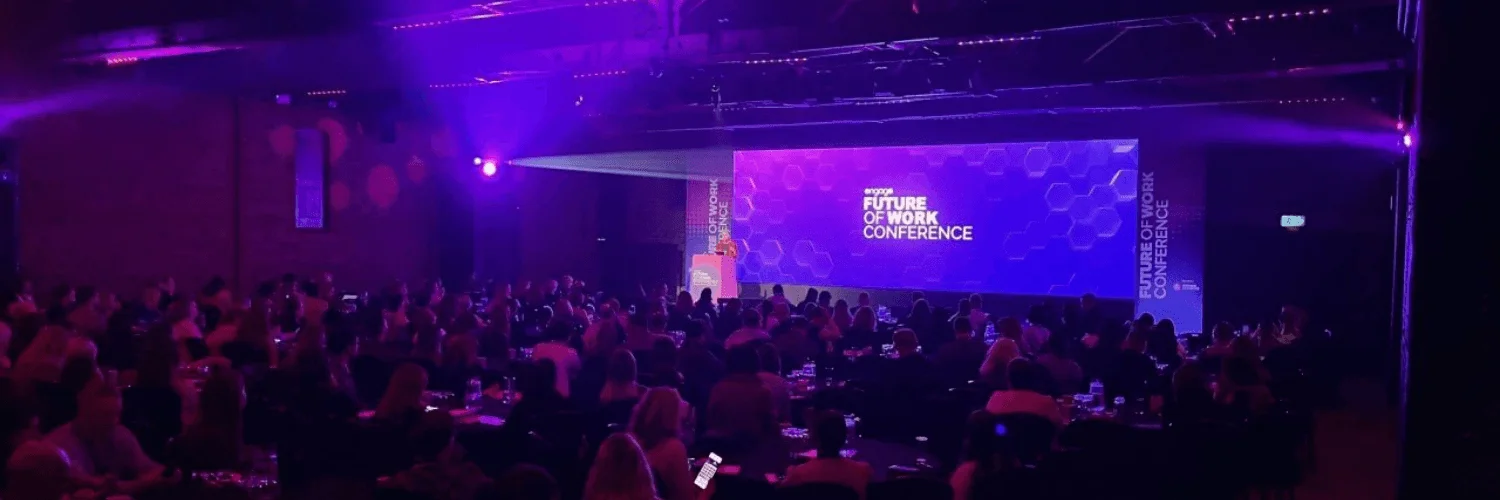YAROOMS Insights from the Future of Work Conference 2024

Earlier this month, the YAROOMS team had the pleasure of attending the Future of Work conference organized by Engage Employee in London. It was a fantastic opportunity to connect with industry leaders and gain valuable insights into building workplace cultures where everyone can thrive. Here’s a quick look at some of the most impactful takeaways we gathered from the event.
Hybrid Work: A New Norm
A key moment during the first panel involved an interactive exercise highlighting the widespread adoption of hybrid work. Attendees were invited to stand if their organizations had transitioned to hybrid work post-pandemic; remarkably, all 200 participants stood up. When asked to sit down if hybrid work was no longer an option, not a single person did. Finally, when asked if they believed hybrid work would continue to be available in the coming year, the entire audience remained standing. The exercise made it clear that hybrid work is widely seen as a new norm and an essential strategy for boosting employee engagement.
Our insights on the topic:
- Exploring the Metrics Behind Your Hybrid Work Model’s Success
- The Hybrid Work Schedule: A Quick Reference Guide with Pros and Cons
Digital Transformation Challenges
Too often, organizations prioritize technology over their people, overlooking the human experience during periods of change. In fact, a collaboration between EY and Oxford Saïd Business School revealed that “an astounding 96% of transformation initiatives encounter major challenges,” underscoring just how vital the human element is in successfully managing change.
It’s increasingly clear that a balanced approach is needed—one that combines technological investments with strategies to help employees navigate these transitions. Additionally, conversations with other attendees highlighted that most companies recognize data and analytics’ critical role in driving technological transformation. It’s this comprehensive, people-centered approach supported by data that will lead to successful and sustainable change.
Our insights on the topic:
- Digital Workplace Transformation: What It Is and How to Prepare
- Facility Management in the Age of Digital Transformation: A Winning Approach
- What Is HR Digital Transformation and Why Is It Important to All Modern Workplaces?
Data and Tech Investment: The Future is Now
Looking ahead, organizations must recognize that data-driven strategies will be essential for making informed, critical decisions. Data and analytics are projected to account for the largest share of tech investments in the next two years, growing from 35% to 53%. This focus is driven by the need to address existing technology and data gaps.
As employee expectations evolve and workplaces become more dynamic, leveraging accurate, real-time data will be crucial for staying competitive and responsive to future demands. Investing in data capabilities now will provide organizations with the agility and insight needed for long-term success.
Our insights on the topic:
- Workplace Analytics Software: Unlocking Insights for Smarter Decisions
- Office Space Optimization with YAROOMS Workplace Analytics
- Facility Management: Elevating C-Suite Decision-Making with Data
Diversity & Inclusion
The conference also highlighted the importance of diversity and inclusion within transformation strategies. Currently, 44% of organizations have integrated diversity targets into their initiatives, yet 26% reported insufficient progress in building a truly inclusive workforce. It is concerning that only one in three companies has established a framework for ethical decision-making around data and technology—an essential component for engaging employees in tech-driven transformation. Without this ethical foundation, efforts to foster inclusion and build trust in new technologies may fall short, hindering innovation and employee buy-in during critical transitions.
Our insights on the topic:
The Future of Jobs
The evolution of job roles, particularly those centered around AI, underscores a reality that we must prepare for today. The emergence of positions like AI Ethicist and AI Data Privacy Manager illustrates the increasing need for interdisciplinary skills that blend technology, ethics, and human-centered thinking. For professionals, now is the time to upskill and align with these emerging trends.
Our insights on the topic:
Final Thoughts
In summary, the conference reinforced the idea that the future of work is not solely about technological advancements but about integrating technology with a deep understanding of the human experience. Successful organizations in this new era will be those that put people first, creating environments where employees feel valued and included. By fostering inclusivity and using technology to enhance, rather than replace, human potential, these organizations will be better equipped to innovate and adapt. Ultimately, the balance between human insight and technological progress will drive lasting success in an increasingly digital world.
Workplace of the future. Today.
See how YAROOMS integrates with Microsoft 365 to create a seamless workspace booking experience.